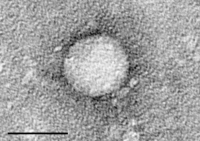
Photo from wikipedia
OBJECTIVES Following clearance of incident hepatitis C virus (HCV) infections, HCV antibody levels may decline, resulting in seroreversion. It is unclear to what extent HCV antibody level trajectories differ between… Click to show full abstract
OBJECTIVES Following clearance of incident hepatitis C virus (HCV) infections, HCV antibody levels may decline, resulting in seroreversion. It is unclear to what extent HCV antibody level trajectories differ between patients with treatment-induced sustained virological response (SVR), those with spontaneous clearance and those with untreated replicating HCV infection. We investigated HCV antibody level dynamics in HIV-infected MSM with different clinical outcomes. METHODS We investigated anti-HCV antibody level dynamics following an incident HCV infection in 67 HIV-infected men who have sex with men (MSM) with different clinical outcomes: SVR (n = 33), spontaneous clearance (n = 12), and untreated replicating infection (n = 22). Antibody levels were measured at the time of HCV diagnosis, and at yearly intervals for 3 years thereafter. RESULTS At baseline, median HCV antibody levels were similar in the three groups: 13.4, 13.8 and 13.5 sample to cut-off (S/CO) for SVR, spontaneous clearance and untreated infection, respectively. Over 3 years of follow-up, SVR was associated with a more pronounced decrease in anti-HCV levels compared with spontaneous clearance and untreated infection [median decline 71% [interquartile range (IQR: 43-87%), 38% (IQR: 29-60%) and 12% (IQR: 9-22%), respectively; P < 0.001]. Seroreversions occurred in five of 33 (15%) patients with SVR and in one of 12 (8%) with spontaneous clearance. A shorter delay between time of infection and treatment start correlated with higher rates of decline in antibody levels. Seven patients experienced a reinfection. CONCLUSIONS Treatment-induced HCV clearance was associated with a more pronounced decline in anti-HCV antibody levels and with higher rates of seroreversion compared with spontaneous clearance or untreated replicating HCV infection among HIV-infected MSM with incident HCV infections. Rapid clearance of HCV RNA following early HCV treatment might impair the development of persistent antibody titres.
Journal Title: HIV Medicine
Year Published: 2018
Link to full text (if available)
Share on Social Media: Sign Up to like & get
recommendations!